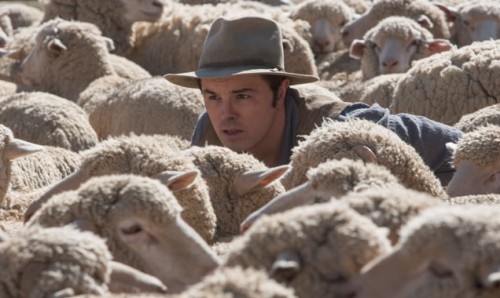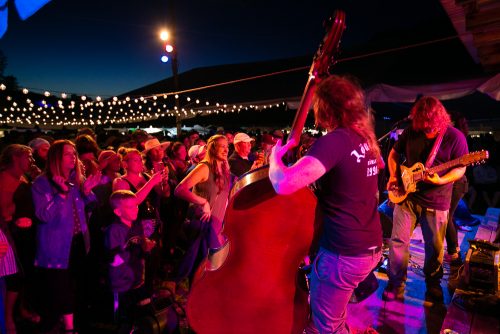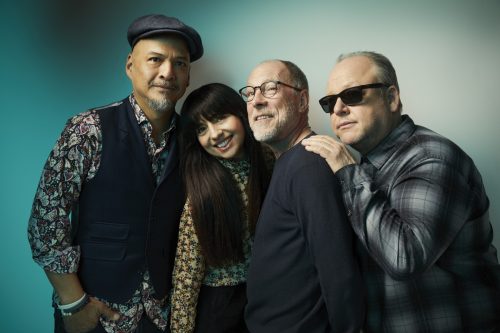By Greg Popil
Let’s get this out of the way: Anyone with even the slightest knowledge of cinematic history is going to hear the term “comedy-western” used to describe Seth MacFarlane’s second feature film “A Million Ways to Die in the West” and immediately think of “Blazing Saddles.” Mel Brooks’ 1974 film about a black sheriff riding into an unbelievably racist small town and his attempts to clean it up will rightfully be featured on “funniest movie of all-time” short lists for as long as critics are compiling them. Featuring amazing gags, unforgettable one-liners and maybe the greatest Gene Wilder performance that doesn’t involve him possibly murdering small children in a candy factory, the memory of “Saddles” will always overshadow any subsequent attempts to combine humor with horseback riding.
So it is to MacFarlane’s credit that, as writer, director, producer and star of “A Million Ways,” the anarchic spirit of Brooks is a minor influence at best here. To be sure, MacFarlane, like Brooks, hews towards the old-school staginess style of humor. The more naturalistic, improvised beats that have come to dominate comedy in the Judd Apatow/Adam McKay era give way here to the kind of staged sight gags MacFarlane no doubt grew up watching in the ’70s and ’80s. Tight, focused choreography is the name of the game, whether in a bar fight or a musical number.
MacFarlane stars as Albert Stark (and how a man as pop culture-obsessed as MacFarlane doesn’t use that name to make a “Game of Thrones” or “Iron Man” reference is beyond me), a poor sheep farmer living in the American frontier of 1882. A genteel, learned, generally levelheaded and cowardly man living in a time and place where those are the least-valued qualities that a man can possess, we meet Albert as he chickens (read: reasons) his way out of a gunfight and is dumped by his girlfriend Louise (Amanda Seyfried). His heartbreak over the loss and general disgust with the setting prompt him to prepare to leave town, when he meets and befriends a mysterious newcomer named Anna (Charlize Theron). Unbeknownst to Albert, Anna’s husband (Liam Neeson) is the most feared outlaw in the territory.
It is at this point that “A Million Ways” tips its hat towards its true influence — this is a 21st century update of the classic Woody Allen romantic comedy formula. Albert’s problem is a lack of self-confidence, brought on by a horrible upbringing (there’s a Tooth Fairy gag late in the film that is one of the most awesomely mean examples of parenting you’ll ever see), and in the classic Allen fashion he masks his fear and self-loathing with the twin shields of barbed intelligence and self-deprecation. An early, profanity-spiked monologue about the misery of living in the desert in 1882 is just a few subject changes away from being about Manhattan in 1975.
And in the classic Allen formula, MacFarlane has found a female muse to be his strongest character by far. After Albert, in a moment of insane courage, challenges Louise’s new beau (a fantastic Neil Patrick Harris) to a duel, he has only one week to learn the way of the gun. Normally this would be the point in the formula where the hero gets help from a wizened old mentor, played by the likes of Laurence Fishburne or, well, Liam Neeson, but “A Million Ways” awesomely has Anna become Albert’s trainer. Theron has been on a roll lately in roles designed to show her as a tightly wound source of power, in movies like “Prometheus” and “Snow White and the Huntsman,” and she clearly relishes the opportunity to let her hair down. It’s her loosest, funniest role since her comedic breakthrough on “Arrested Development,” and she and MacFarlane have terrific chemistry.
None of that would matter, of course, if “A Million Ways” wasn’t funny, and it is, more often than not. MacFarlane, whose “Family Guy” show is more or less defined by its random cutaway gags, has a troubling tendency to stop his movies cold so he can throw an out-of-place joke into the mix, like a shadow puppet gag during the opening gun fight, or a pop culture cameo that is supposed to be funny simply because we’re looking at a celebrity (although one of those, in the very last scene, helps redeem the most cringe-worthy, race-related joke from earlier in the film). But when he keeps his humor in context, it can be dynamite. Giovanni Ribisi and Sarah Silverman are fantastic as MacFarlane’s best friend and his hilariously sincere prostitute girlfriend (she wants to save herself for their wedding night, despite her profession), and Anna and Albert have some great fun with a pot cookie scene that actually helps set up Albert’s vision quest late in the film. MacFarlane likes his big set pieces, but some of his funniest, most memorable bits come from spare snippets of dialogue (“I come from Kansas City.” “Oh, Kansas, huh?” “No, it’s actually in Missouri.” “Oh right, that’s…weird and annoying.”).
In his first significant non-animated starring role, MacFarlane shows a lot of charisma, and he thankfully tempers down the angrier, more hateful aspect of some of his TV work (the general tone is far more “American Dad” genial than “Family Guy” sour). After “Ted,” this is MacFarlane’s second movie about needing to overcome personal demons and face up to the responsibilities of adulthood. This review was written three days after the finale of “Cosmos,” a wonderful show about state of the scientific world, which MacFarlane produced. A little maturity looks good on him, even if it is encrusted in semen and fecal humor.
Rating: 65/81




Leave a Reply